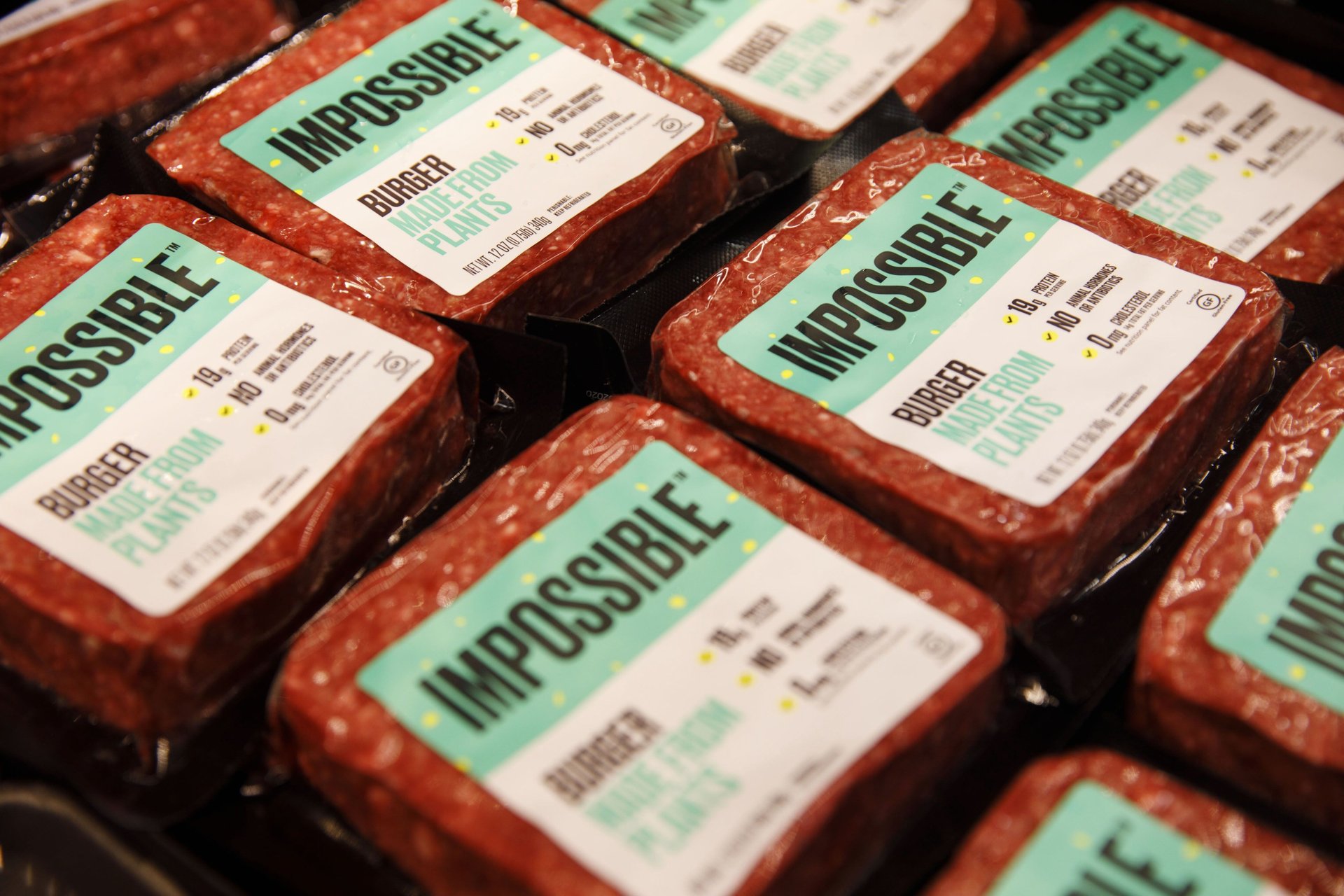The fake meat industry is getting desperate
After years of sky-high valuations, plant-based meat companies are grappling with shrinking sales and the reality that Americans prefer the real thing

Patrick T. Fallon/Bloomberg via Getty Images
A version of this article originally appeared in Quartz’s members-only Weekend Brief newsletter. Quartz members get access to exclusive newsletters and more. Sign up here.
When Impossible Foods CEO Peter McGuinness hints that his plant-based meat company might start blending real beef into its burgers, you know the fake meat industry has reached a crossroads. The executive who once promised to save the planet one meatless patty at a time is now considering the very ingredient his company was founded to eliminate.
The confession reveals just how desperate the alternative protein sector has become. After years of sky-high valuations and promises to revolutionize dinner plates, plant-based meat companies are grappling with shrinking sales, consumer backlash over taste and price, and the uncomfortable reality that Americans still overwhelmingly prefer the real thing. With Beyond Meat's stock down 97% from its peak and the industry shedding jobs, fake meat makers are scrambling to find new strategies, including ones that seem to go against their core mission.
The numbers tell a brutal story. Beyond Meat, once the darling of Wall Street with a market capitalization that soared to $10 billion, now trades at roughly $200 million. The stock went public in 2019 at a $1.5 billion valuation amid breathless predictions that plant-based protein would soon dominate American plates. Today, it has yet to turn a profit.
The decline isn't limited to public markets. Plant-based meat retail sales fell 7% in 2024, extending a downward spiral that began in 2021, according to Good Food Institute (GFI), a nonprofit that tracks plant- and cell-based alternatives to animal products. Impossible Foods, despite being privately held with more than $2 billion in funding from investors like Bill Gates and Google Ventures, has conducted multiple rounds of layoffs. McGuinness said profitability remains "years away," according to the Wall Street Journal.
There are some possible bright spots on the horizon. Impossible Foods is betting on European expansion, where McGuinness believes consumers are more receptive to plant-based options. The company is awaiting final regulatory approval for its signature ingredient in Europe, potentially opening up what Euromonitor calls the world's biggest market for meat alternatives.
McGuinness, who took over Impossible Foods in 2022 after a successful run building Chobani into a $2 billion yogurt empire, doesn't mince words about what went wrong. The industry, he says, "did a lousy job" of marketing itself. "It was against the cattle industry. It was against the slaughter cartel,” McGuinness told Inc. magazine. “If you ate meat, you were a Neanderthal. We were insulting meat eaters."
Meanwhile, practical problems persisted. Plant-based alternatives remain 82% more expensive than conventional meat, according to GFI, while taste tests consistently show most consumers prefer the real thing. The rise of concerns about ultra-processed foods hasn't helped, with critics labeling many meat alternatives as "Frankenfoods."
Faced with these realities, Impossible Foods is pivoting toward "flexitarians,” or the roughly 100 million Americans who eat both plant-based and conventional meat. This audience represents a more pragmatic target than committed vegans or die-hard carnivores.
Enter the blended burger: half plant-based protein, half real beef. "To get this category going, I may do a hybrid burger that's 50% beef," McGuinness told The Wall Street Journal, a remark that would have been heretical just a few years ago. The logic is compelling. Blended products can address taste concerns while reducing costs and improving nutrition, according to McGuinness.
The funding drought is making the pivot even more urgent. Investment in plant-based startups plummeted 64% in 2024 to just $309 million, down from $854 million the previous year, according to the GFI. Without successful exits to demonstrate the sector's viability, analysts predict consolidation is inevitable as companies unable to secure funding downsize, close, or merge with competitors.
The stakes extend beyond any single company. The plant-based meat industry bet big on the idea that consumers would embrace alternatives for environmental and ethical reasons, even if they cost more and tasted different. That bet increasingly looks wrong. The sector now faces a fundamental choice: double down on pure plant-based products and hope for a breakthrough in taste and cost, or compromise on purity to achieve the scale needed for survival.
Either path carries risks. Pure plant-based advocates worry that blended products legitimize meat consumption rather than replacing it. But purists may be fighting market forces too powerful to overcome. Even among households that buy both types of products, Americans spent an average of $632 on conventional meat in 2024 versus just $50 on plant-based alternatives, according to the Good Food Institute. After a decade of hype, fake meat remains a tiny sliver of the market.
